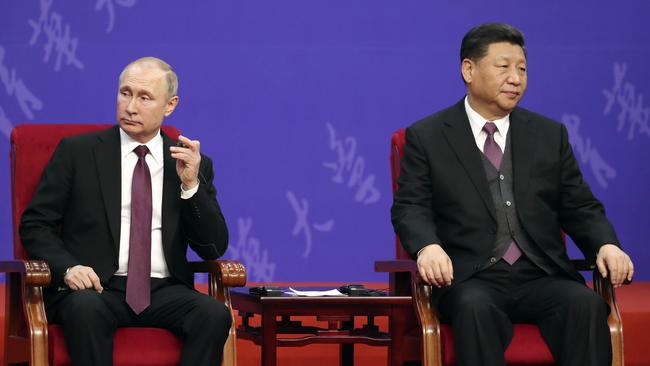Xi Jinping lays down a new world order in Belt and Road Initiative
Xi Jinping has outlined plans to expand his Belt and Road Initiative into a broader economic and social co-operation area.

China’s President Xi Jinping has outlined plans to expand his Belt and Road Initiative into a broader economic and social co-operation between signatory countries, stepping up the idea of a Beijing-led global order in contrast with Donald Trump’s America First stand.
Speaking at the second Belt and Road conference in Beijing yesterday, Mr Xi said there would be improved transparency and “zero tolerance” for corruption in BRI projects, addressing some of the main criticisms of the concept he first outlined in 2013.
Initially seen as a series of infrastructure projects such as ports, road and railways, to boost China’s trade with Asia, Europe and Africa, Mr Xi’s speech outlined plans to expand it with more people-to-people exchanges, and more co-operation in areas such as science, technology, health, agricultural development and environmental protection.
He outlined plans to invite 10,000 people involved in politics, NGOs and think tanks from the more than 120 BRI-supporting countries to China and “innovation” exchanges involving more than 5000 people over the next five years, more free-trade agreements and more purchases by China of foreign goods.
“We need to promote a global partnership for connectivity,” he said. “As we work closely together we will transcend geographical distance and embark on a path of win-win co-operation.
“We want to sow the seeds of co-operation, harvest the fruits of development, bring greater happiness to our people and make our world a better place for all.”
While he did not mention the US directly, he said China would not be engaging in any “beggar thy neighbour” currency devaluations and said it would support the introduction of mechanisms to enforce FTAs — issues expected to be considered in the trade deal being negotiated with the US.
He said China would enforce more protection of intellectual property rights, end forced technology transfers and protect trademarks and trade secrets.
He also indicated that China was prepared to significantly step up imports of “quality products from across the world”. “China does not seek trade surpluses,” he said. “We want to import more agricultural products, manufactured goods and services to promote more balanced growth of China’s foreign trade.”
Mr Xi’s speech was followed by others by world leaders visiting Beijing for the conference, including Russian President Vladimir Putin, Malaysia’s Prime Minister Mahathir Mohamad and Pakistan’s Imran Khan.
More than 120 countries have signed various agreements to back Mr Xi’s BRI concept, with Italy and Switzerland being among the latest signatories.
Australia has not signed up to the BRI but the conference was attended by Victorian Premier Daniel Andrews following his state’s move to sign a memorandum of understanding last year.
The forum is expected to produce a communique today seeking to address some of the criticisms of the BRI, including that it amounts “debt trap diplomacy” by saddling small countries with uneconomic infrastructure projects and that some have involved corruption and questionable tendering processes.
Mr Xi said the BRI was “not an exclusive club” and was prepared to work with other organisations — addressing concerns the concept was a series of China-led bilateral relationships. “We need to ensure the fiscal sustainability of all projects,” he said. “We will adopt widely accepted rules and encourage companies to follow international standards in bidding, procurement and tendering.”
Mr Putin told the forum the BRI would help boost the economies of Eurasia and counter the “fragmentation” of the region.
In a clear reference to Mr Trump, Mr Putin said the BRI was a way of countering the “rise of protectionism”, “unilateralism”, trade wars and slowing world economic growth and the technological gap between countries. Mr Putin said these “negative trends were breeding grounds for terrorism, extremism and unlawful migration”.
Mr Khan, a beneficiary of a BRI project — the China Pakistan Economic Corridor — said the it offered a “model of collaboration, partnership, connectivity and shared prosperity” in a “world of geopolitical uncertainty, rising inequality and barriers to trade”.
He said the presence of so many world leaders at the forum was a sign that they were “choosing hope over despair and co-operation over confrontation”.
He said the BRI projects had helped to increase Pakistan’s energy supplies and transform the once small fishing village of Gwadar, on the Arabian Sea, into a “commercial hub”. He suggested that the BRI countries agree on ways to promote more tourism.
He also called for the establishment of an office of anti-corruption to “combat the scourge of white collar crime which he said had “devastated the developing world” and the establishment of a “poverty alleviation fund” to help third world countries counter the effect of poverty and malnutrition.




To join the conversation, please log in. Don't have an account? Register
Join the conversation, you are commenting as Logout